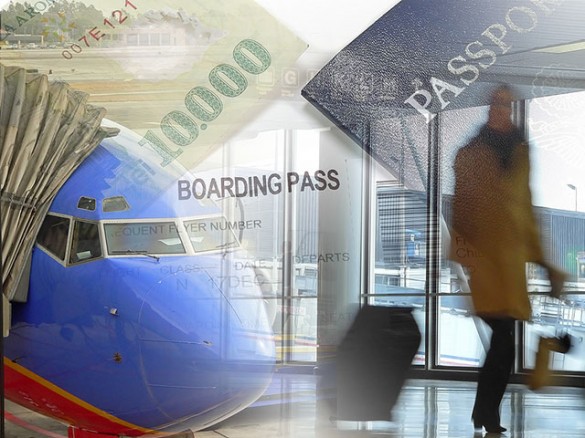You probably know how important it is to secure your passport while traveling internationally, but you might not know that safeguarding your credit cards is vital as well. Paying for overseas purchases with a credit card can be incredibly convenient – you don’t have to hassle with converting cash, and you can generally receive a lower conversion rate than you would with traveler’s checks.
But if you’re not careful, a credit card mishap could interrupt or even ruin your trip. Keep these eight tips in mind when traveling abroad:
1. Limit the Number of Cards You Travel With
Limit yourself to two or three credit cards – you need at least one backup, and you may want to take advantage of different rewards features. Make sure at least one or all of your cards don’t charge foreign transaction fees, or consider opening a new card before you go with benefits specific to international travel. One of the best options is the Chase British Airways credit card, which doesn’t charge a foreign transaction fee, and offers generous rewards and the ability to earn free companion airline vouchers. For Americans, Capital One is a great option as they don’t charge any foreign transaction fees like most other cards.

2. Record Credit Card Information
If one of your cards is lost or stolen, report it immediately. To do so, you need all relevant information at your fingertips, including card numbers. But if you can’t easily access this information, it can be quite a hassle.
Before you leave home, record credit card numbers, security codes, and the issuers’ contact information in a secure place. If you store it in your phone, for example, you may want to also make a hard copy and store it in a hotel safe once you arrive. That way, if something happens, you can close your cards at once.
3. Notify Credit Card Companies Before You Leave
Contact credit card issuers before you travel to inform them of your plans. Otherwise, they could deem a run of charges on your card in another country suspicious and suspend the account. Under the best circumstances, this could be a mild inconvenience. Under the worst circumstances; however, you could be left stranded without resources far away from home.
4. Get a “Chip-and-PIN” Card
This may require some work, but it’s worth looking into. Many European vendors now only accept payments from cards that have an embedded chip in them. The Chase British Airways credit card has this technology, and Wells Fargo offers a few cards with it as well. You can also get a prepaid debit MasterCard from Travelex, which is available in both pounds and Euros. However, if you go this route, only use the card as a last resort, as exchange rates aren’t favorable.
5. Only Carry With You The Cards You’ll Need
Before you leave your hotel to go anywhere, make sure you only take the cards you may need. If you have a day or an evening planned where you know you won’t be spending anything, leave them all at home. If you’re headed back to a restaurant or other business where you know which card they accept, just take that. I really can’t emphasize enough how devastating dealing with a lost or stolen credit card can be on your trip. This happened to me once, and it took the better part of a day to get it straightened out. This meant one less full day of sightseeing that I missed out on.
6. Always Bring Your Passport With You
If you’re unable to get a “chip-and-PIN” card, carry your passport with you as well. Some merchants that still accept traditional credit cards as a form of payment may ask to see your passport to confirm your identity.
7. Avoid Suspicious ATMs
Debit card “skimming” schemes exist internationally and domestically. These are plots in which criminals attempt to steal your account information by placing a tiny device over the card slot in an ATM. To avoid becoming a victim, limit yourself only to machines that are connected to large, well-known banks. Otherwise, your information could be compromised, or you may lose the card and have no idea how to retrieve it. Read more about ATM Skimmers.
8. Keep All Receipts
Keep your sales receipts for all restaurant, gift shop, grocery store, and tourist attraction purchases. Basically, hold on to any receipt where you paid with a credit card. Once you return home, reconcile these receipts with your credit card statement as an added precaution of unauthorized charges.
Final Thoughts
The benefits of using credit cards while traveling internationally are significant, but it’s still prudent to carry a small amount of cash. Many roadside souvenir vendors don’t accept credit cards, and even a few larger establishments will only accept cash. Take a couple of credit cards with solid travel benefits, a chip-and-PIN card if you can get one, and a small amount of cash. That way, you should be able to pay for almost anything no matter where you are.
What other tips do you have for using credit cards overseas?
David Bakke is based out of Atlanta and blogs about smart shopping, credit cards, money management, and travel tips on the popular Money Crashers personal finance blog.
Photo credits: Rich Bowen, all others courtesy of the author and may not be used without permission

